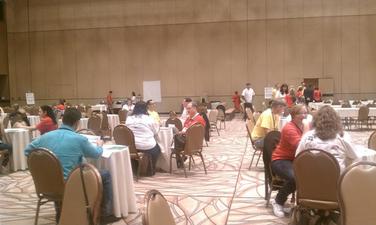CORE Actions of Responsibility
“The most powerful and perhaps the only means that we still possess of interesting
men in the welfare of their country is to make them participate in the government.”
Alexis de Tocqueville
men in the welfare of their country is to make them participate in the government.”
Alexis de Tocqueville
Educating New Citizens & Building Communities

CORE emphasizes Civic Education and the importance of personal and civic responsibility and teaches citizenship values to represent productive, responsible, caring and contributing members of society. CORE believes that civic responsibility is the cornerstone of a whole and healthy community that can assimilate and integrate the new citizens. Some of the attitudes related to civic responsibility include the intention to serve others, the belief that helping others is one’ s social responsibility, and the tolerance and appreciation of human differences. Civic responsibility is taught to include participation in government, church, and memberships of voluntary associations. Actions of civic responsibility can be in the form of advocacy for various causes such as political, economic, civil, and environmental or quality of life issues. By engaging in civic responsibility, the new citizens will ensure and uphold certain democratic values covered in their civics classes and written in the United States Constitution and punctuated in the Bill of Rights. Those values or duties include justice, freedom, equality, diversity, authority, privacy, due process, property, participation, truth, patriotism, human rights and rule of law, tolerance, mutual assistance, self-restraint and self-respect. The goal is hopefully to produce responsible citizens and active participants in community and government.
What does it mean to be a responsible citizen?
- Knowing public good and personal interests
- Supporting one’s family, caring for, nurturing and educating one’s children
- Accepting responsibility for the consequences of one’s actions
- Adhering to moral principals
- Participating in social activities and the life of the community
- Considering the rights and interests of others
- Behaving in a civil manner
- Taking care of oneself
What are the responsibilities of a good citizen?
- Obeying the law
- Paying taxes
- Respecting the rights of others
- Being informed and paying attention to public issues
- Monitoring political leaders and governmental agencies
- Taking appropriate actions if public officials are not adhering to constitutional principles
- Deciding whether and how to vote
- Participating in civic groups
- Performing public service
- Serving as a juror
- Serving in the Armed Forces

